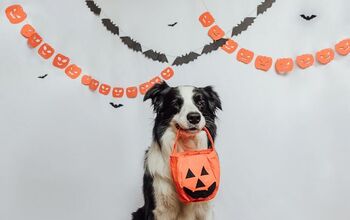Imagine waking up in the middle of the night to the sound of your dog’s persistent coughing. It’s a scenario that no pet parent wants to face, one that can bring panic and stress. But it’s also an important reminder about one crucial point: Coughing in dogs, while sometimes seemingly minor, can be a sign of underlying health issues – some of which can be pretty serious!The causes of a dog’s cough can vary from simple irritations to more concerning medical conditions. That’s why it’s so important to recognize that a persistent cough isn’t something to ignore.This blog post will provide the information you need to better understand your dog’s cough, identify the potential causes, and (most importantly) know when to seek immediate veterinary help. I will share the different types of coughs, how to recognize the more common causes, and steps you can take to prevent that unwanted cough; keeping your dog happy and healthy.Understanding Coughing in DogsCoughing is a natural reflex designed to clear the airways of irritants. An occasional cough might not be a cause for alarm. In fact, it may even be healthy. For example, if your dog was sniffing outdoors and inhaled a bunch of pollen, coughing could effectively clear this common allergen out of their system. But a persistent cough is a different story.Your dog’s ongoing or constant coughing could signal that something isn’t right, and paying attention is crucial. Understanding the nuances of your dog’s cough and communicating them to your veterinarian can help you reach a diagnosis and find a suitable treatment option faster.Here are the most common types of canine coughs:Honking Cough: Often described as sounding like a goose, this type of cough is frequently associated with kennel cough or tracheal collapse.Dry, Hacking Cough: This type of cough might point towards kennel cough as well, but it could also be triggered by many common allergies or other irritants your dog has been exposed to. Wet, Productive Cough: A wet cough often sounds like your dog is bringing something up. This can be more concerning and is usually associated with pneumonia, heart disease, or other severe medical conditions.Coughing Followed by Vomiting or Gagging: While sometimes seen with kennel cough, it could signal something more serious if your dog is vomiting after they cough.The distinction between these different types is so important. By carefully noting the specific sound and characteristics of your dog’s cough, you can provide your veterinarian with key information they may not be able to collect during an appointment. We’ve all been to a vet appointment where we’ve tried to explain what’s happening because it somehow magically stopped the moment we walked through the door.A short video recording on your phone can be incredibly helpful, allowing your vet to hear the cough firsthand.Common Causes of Coughing in DogsSeveral factors can contribute to your dog’s cough, ranging from minor ailments to serious medical conditions. As a responsible and loving dog parent, I recommend learning the most common causes and what other symptoms to look out for to help you better understand what your dog is experiencing.Kennel Cough (Infectious Tracheobronchitis)This highly contagious respiratory infection often spreads in places where large numbers of dogs congregate, such as boarding facilities, dog parks, and kennels. It’s characterized by a distinctive “honking” cough, which may be accompanied by other cold-like symptoms. While kennel cough will often clear up on its own (much like a human cold), sometimes antibiotics or cough suppressants are necessary. Fortunately, vaccination is an effective preventative measure, especially if you know your dog often frequents high-risk areas.Tracheal CollapseThis occurs when the trachea, or windpipe, weakens. Tracheal collapse most often affects small breeds, but it can happen in any size of dog. The hallmark symptom is a goose-like “honking” couch, which can worsen with excitement or exercise. If you suspect you may be dealing with tracheal collapse, contact your veterinarian. Treatment options include medications, weight management, and, in some cases, surgery.Heart DiseaseThe heart is likely not the first thing that comes to mind when considering the cause of a cough, but coughing can be a significant symptom of heart disease, particularly heart failure. This couch is often worse at night or after exercise and may be accompanied by other signs of heart trouble, like fatigue, weakness, and difficulty breathing. If your dog is diagnosed with heart disease, they will need ongoing management of the underlying heart condition by your veterinarian.Pneumonia Pneumonia, an inflammation of the lungs, can be caused by bacterial, viral, or fungal infections. It is typically associated with a wet, productive cough. Other common symptoms of pneumonia in dogs include:FeverDifficulty breathing or swallowingNasal dischargeRapid heart rateAltered moodChanges in appetiteLethargy or sluggishnessTreatment for pneumonia usually involves antibiotics. Your dog may also require supportive care, addressing some of the symptoms to allow their body to heal. For example, if your dog is struggling with loss of appetite, your vet may recommend an appetite stimulant.Allergies and IrritantsJust like humans, dogs can suffer from environmental allergies and react to inhaled irritants like smoke, dust, and pollen. These allergies and irritants usually trigger a dry, hacking cough. You may also notice other signs your dog is suffering from allergies, such as sneezing, a runny nose, itchy eyes, ear infections, inflamed skin, and paw licking. Treatment usually involves antibiotics and supportive care.Canine DistemperThis serious and potentially fatal viral illness is thankfully preventable through vaccination. However, if you have a young puppy who hasn’t completed their puppy vaccination schedule, they are at risk. Coughing is one of the most common symptoms, along with fever and neurological signs. If you suspect your dog may have distemper, it is an emergency and requires immediate veterinary care. Treatment is supportive and often intensive.



























